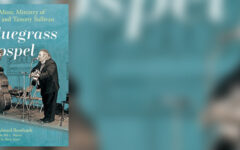 Another book I recently finished is Ralph Stanley’s autobiography, Man Of Constant Sorrow: The Life & Times Of A Music Legend. In it, the good Doctor tells the story of his life from dirt poverty in the mountains of southwestern Virginia to the heights of music industry success on the stage of the Grammy Awards.
Another book I recently finished is Ralph Stanley’s autobiography, Man Of Constant Sorrow: The Life & Times Of A Music Legend. In it, the good Doctor tells the story of his life from dirt poverty in the mountains of southwestern Virginia to the heights of music industry success on the stage of the Grammy Awards.
Stanley’s story, as told to Eddie Dean in a series of recorded interviews, is presented in the authentic voice of a mountain man. No effort was made to clean up the grammar, retaining the dialect and the cadence familiar to any who have visited with Ralph or seen him repeatedly on stage.
In fact, the effect is not unlike spending several weekends with your grandpa, hearing stories of the good ol’ days. This is Stanley’s version of his life, without corroboration or verification, so historians and contemporaries may find items worthy of a quibble, but the story laid out in this book is pure joy for any fan of Ralph Stanley or The Stanley Brothers.
The more recent era of Ralph’s life has been more widely covered, but he had not spoken in any depth about his brother and his most untimely death until now. It is a tragic but familiar story of alcohol abuse, especially juxtaposed agaisnt the picture of Carter that is presented in the book: fun-loving, gregarious and possessed of a rare gift for singing and songwriting.
Ralph was clearly devastated by the loss, both after Carter’s passing in 1966, and in the years leading up to his death as he watched his brother’s health fail. It’s not the focus of the book, but it is undoubtedly a defining fact of his life, as he makes plain in the text. He talks many times about staying true to the sound that he and Carter created.
For a devoted fan of their music – or just a dedicated bluegrass lover – it can bring chills reading of Carter calling out from the back seat of The Stanley Brothers touring vehicle (a cramped station wagon) with the first few lines of White Dove. And I couldn’t help but laugh as Ralph told of Carter punching Lester Flatt is the face outside of WCBY in Bristol, or slipping Ex-Lax to one of Bill Monroe’s female companions at a show.
Younger bluegrass musicians will be fascinated by the stories of jealousy and camaraderie among the first generation of bluegrass pioneers, as they will be stunned by the harsh conditions and powerlessness these artists faced. It helps you realize that the survival of bluegrass music was never a sure thing, especially after Elvis Presley decimated the market for country and “hillbilly” music in the 1950s.
All in all, it’s a wonderful book for any Stanley fan, or for anyone who has even a passing interest in the development of what came to be known as bluegrass music – though Ralph won’t use the word to describe what he does. It also serves as a gritty and visceral reminder of the desperate poverty that gripped the Appalachian region of the country in the 1930s.
Man Of Constant Sorrow: The Life & Times Of A Music Legend is available in hardcover, paperback and ebook editions from Penguin Books. It is widely available wherever books are sold.








